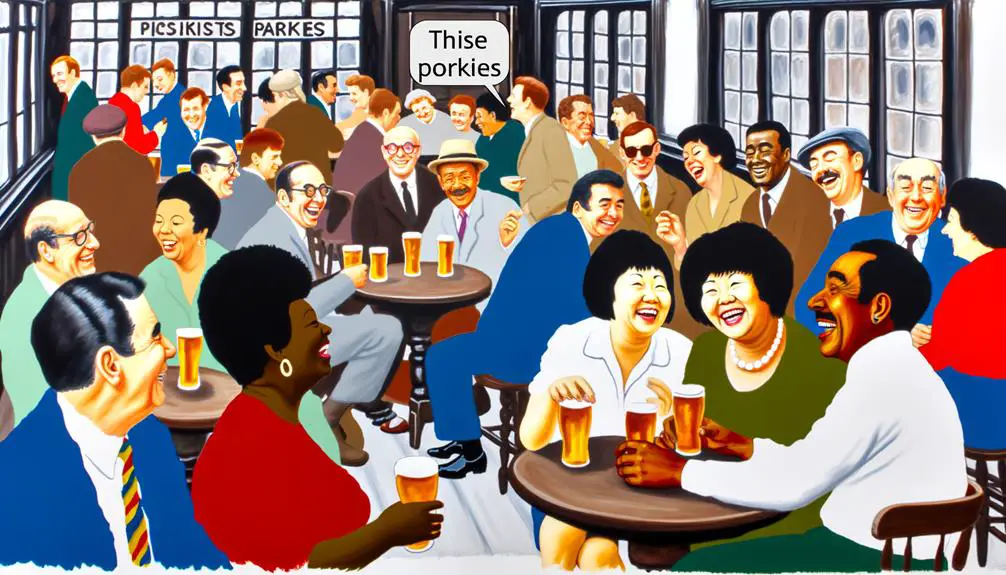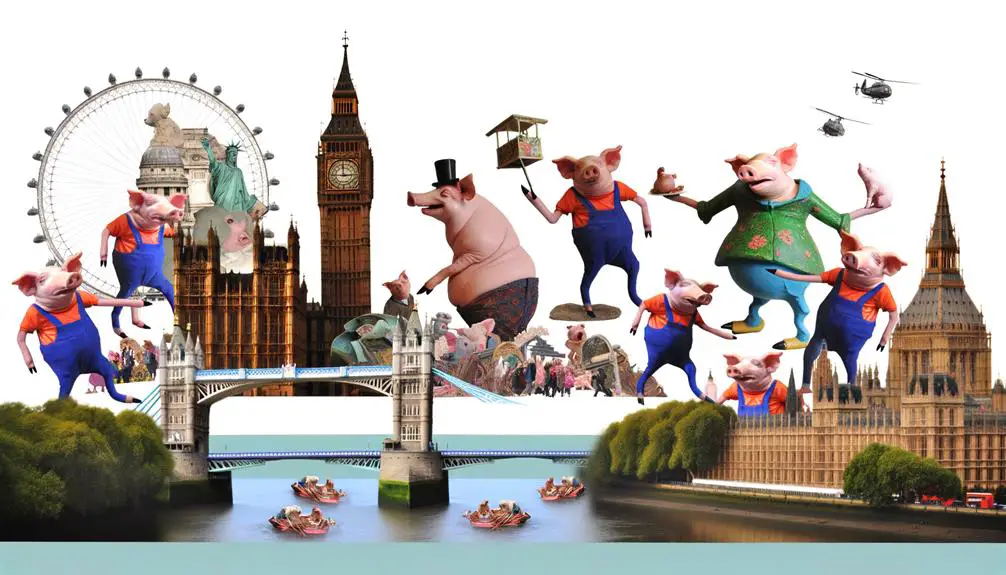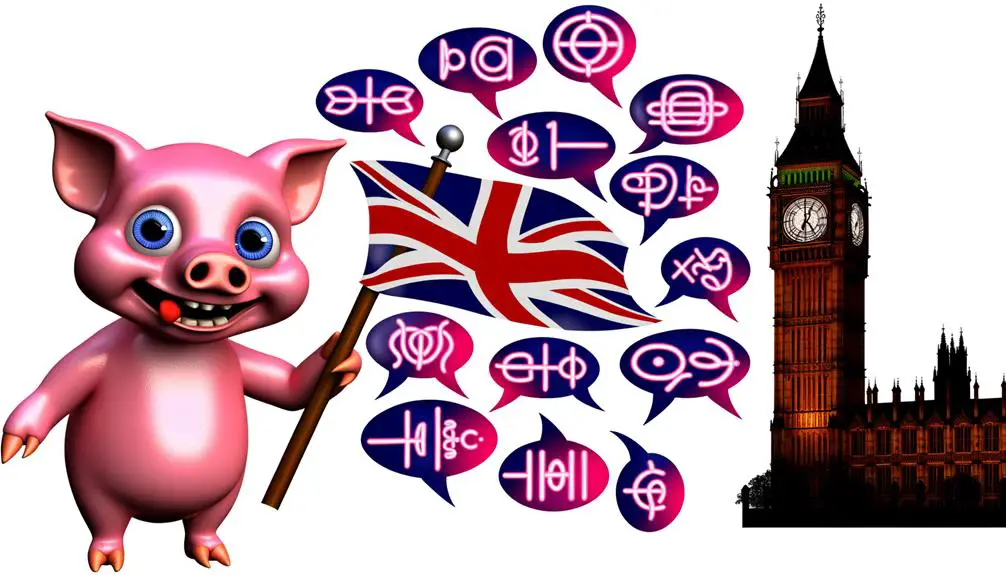In British slang, 'porkies' means 'lies'. It's an evolution of Cockney rhyming slang, where 'pork pies' rhymes with lies. This term showcases the evolution of language, originating from the East End of London but has spread across the UK. The shift from local dialect to widespread usage illustrates the adaptability and resilience of Cockney culture. Modern usage has simplified many slang expressions, losing their rhyming counterpart, yet 'porkies' remains recognizable and prevalent in pop culture. This signifies its versatility and enduring presence in British identity. Unpacking its origins offers insights into the richness of slang's landscape.
Origins of 'Porkies'
The term 'Porkies', a quintessential piece of British slang, finds its roots in the Cockney rhyming slang for 'lies' — 'pork pies'. This intriguing phrase showcases the linguistic evolution inherent in regional dialects, particularly within the vibrant communities of East London. The Porky pies etymology is a fascinating study of how language adapts and morphs over time, rooted in the playful and secretive nature of Cockney rhyming slang.
You'll find that 'Porkies' exemplifies how certain phrases become detached from their original context yet retain their meaning. Initially, saying 'pork pies' in a conversation was a clever way to encode the message among those in the know, effectively obscuring the meaning from outsiders. Over time, 'Porkies' has transcended its Cockney origins to become widely recognized across the UK as synonymous with falsehoods.
This shift from a localized slang to a nationally understood term is indicative of the dynamic nature of language. It underscores how expressions evolve, spreading far beyond their initial geographic and social boundaries. The journey of 'Porkies' from a specific East London idiom to a broadly recognized British slang highlights the intricate pathways of linguistic evolution, illustrating how language is an ever-changing tapestry woven from the threads of culture, community, and creativity.
Understanding Cockney Rhyming Slang
You'll find that Cockney rhyming slang, with its origins deeply rooted in London's East End, presents a fascinating linguistic twist.
Understanding its structure requires you to grasp how phrases like 'porkies'—meaning lies—cryptically evolve from 'pork pies' through a process of rhyme and abbreviation.
This exploration offers insights into the inventive adaptability of language within specific cultural contexts.
Origins of Cockney Slang
Delving into Cockney rhyming slang reveals its roots in 19th-century London's East End, serving as a vibrant linguistic code among locals. This unique form of communication, characterized by its inventive use of rhyme and metaphor, stems directly from the Cockney dialect's features.
As you explore its origins, you'll find that this dialect not only provided a sense of community but also functioned as a cryptic language, inaccessible to outsiders. Observing slang evolution trends, it's clear that Cockney rhyming slang adapted over time, incorporating contemporary references while retaining its core linguistic creativity.
This evolution reflects broader changes in social and cultural dynamics within the East End, highlighting the adaptability and resilience of Cockney culture and its language practices.
Decoding Rhyming Expressions
Having explored the origins of Cockney slang, let's now unravel the complexities of its rhyming expressions to fully grasp this linguistic phenomenon.
Delving into these expressions reveals a vibrant tapestry of language evolution and cultural idioms. Cockney rhyming slang isn't just about the rhyme; it's a creative dance with words, where meanings are layered and often hidden in plain sight.
You're not just learning a language; you're decoding a cultural code, where phrases like 'porkies' (lies) from 'pork pies' showcase the ingenuity at play. Understanding these expressions demands attention to their historical context and an appreciation for the subtle art of wordplay.
It's a proof to the dynamic nature of language, constantly evolving while preserving a unique cultural identity.
'Porkies' in Modern Usage

You've seen how 'porkies,' rooted in Cockney rhyming slang, has woven its way through British culture, but its journey doesn't stop there.
Its presence in pop culture, from films to music, showcases its evolution and enduring appeal.
Origins in Cockney Rhyming
The term 'porkies,' a staple in modern British slang, traces its roots back to Cockney rhyming slang, where it originally meant 'lies.'
This linguistic evolution, originating from the East End of London, cleverly masks words in phrases that rhyme. 'Porkies' derives from the longer phrase 'pork pies,' which rhymes with 'lies.' The pie origins of this term highlight the playful and creative nature of Cockney rhyming slang's progression over time.
As slang evolves, many such expressions lose their rhyming counterparts, becoming standalone terms. 'Porkies' exemplifies this shift, moving from its specific context within a rhyming framework to a broader usage in everyday language as a synonym for falsehoods.
This development reflects the dynamic nature of slang and its ability to adapt and simplify over time for wider communication.
Porkies in Pop Culture
Reflecting its evolution from Cockney rhyming slang to mainstream vernacular, 'porkies' has solidified its place in pop culture, influencing various forms of media and everyday conversation.
You've likely come across 'porkies' memes, cleverly capturing moments of disbelief or exaggeration, shared widely across social media platforms. These visual jests not only highlight the term's comedic potential but also showcase its adaptability and enduring relevance.
Additionally, celebrity tweets often sprinkle 'porkies' into their messages, lending an air of authenticity and relatability to their public personas. This casual integration by public figures further cements 'porkies' in the lexicon of modern usage, demonstrating its shift from niche slang to a recognized term in the broader dialogue of pop culture.
Variations Across the UK
Across the UK, you'll find that the meaning and usage of 'porkies' can vary considerably from one region to another. This variation is deeply rooted in the rich tapestry of regional dialects and carries a significant cultural significance that goes beyond mere linguistic differences.
In some areas, 'porkies' might be used more liberally, woven into daily conversations not just as a term for falsehoods but as a playful nod to local storytelling traditions. In others, its usage could be more reserved, reflecting perhaps a community's values around honesty and transparency.
Diving into the specifics, in places with a strong tradition of oral history and storytelling, 'porkies' might carry a lighter, almost affectionate connotation. It's not just about lying, but about embellishing stories to entertain or teach. Contrast this with regions where straightforward communication is prized, and you'll notice 'porkies' being used more critically, marking a clear deviation from accepted social norms.
Understanding these nuances requires not just a grasp of the words themselves, but an appreciation of the cultural contexts that give them life. It's a fascinating glimpse into how language evolves and adapts, reflecting the diverse experiences and values of its speakers.
Popular Culture References

Delving into popular culture, you'll discover that 'porkies' frequently pops up in various forms of media, subtly influencing perceptions and usage of this slang term. It's not just nestled within the dialogue of British films and television series; it's also echoed in the lyrics of songs, showcasing the term's versatility and enduring charm. This widespread usage guarantees that 'porkies' remains in the public consciousness, not just as a colloquialism but as a vibrant part of British cultural identity.
The influence of celebrity endorsements can't be understated in this scenario. When public figures and influencers use 'porkies' in their communication, whether in interviews, on social media platforms, or during public appearances, they lend the term a certain cachet. This endorsement often leads to spikes in usage, particularly among fans and followers, making 'porkies' a dynamic element of social media trends. The term's presence on platforms like Twitter, Instagram, and TikTok has helped in solidifying its status in modern vernacular, bridging generations and geographies. Through these channels, 'porkies' has become more than just slang; it's a cultural touchstone that reflects the playful intricacies of language and identity.
Detecting 'Porkies'
In today's digital age, you'll find that identifying when someone is telling 'porkies'—a task once reliant on face-to-face interactions—has become a nuanced art form. With the evolution of communication channels, lie detection techniques and truth verification methods have had to adapt, ensuring that the essence of sincerity isn't lost in the digital ether.
To navigate this landscape, you'll need to employ updated lie detection techniques. Body language cues, once a staple in unmasking dishonesty, have taken a back seat to textual analysis and digital footprint examination. Paying attention to inconsistencies in stories shared online, the timing of messages, and the presence of details that can be independently verified can serve as modern-day lie detectors.
Furthermore, truth verification methods have evolved to include digital tools and software designed to analyze speech patterns and writing styles for signs of stress or deception. These tools, while not infallible, add an extra layer of scrutiny to the words we read and hear online.
In embracing these contemporary approaches, you're not just adapting to the changes in how we communicate; you're mastering the art of discerning truth from 'porkies' in a world where the lines between the two are increasingly blurred.
Enhancing Your Slang Vocabulary
Understanding the nuances of 'porkies' equips you with a foundational skill, but expanding your slang vocabulary further enhances your grasp of contemporary communication. Delving into slang evolution trends, you'll notice patterns and shifts that reflect societal changes, tech advancements, and cultural cross-pollination. This insight not just broadens your lexicon but also deepens your understanding of language as a dynamic, living entity.
Engaging in global slang comparisons sharpens your linguistic adaptability. It's fascinating to observe how different cultures coin phrases for similar experiences or emotions, and yet, these expressions carry unique cultural fingerprints. For instance, while Brits might say 'porkies' for lies, Australians have 'furphies'. This exploration not only enriches your slang arsenal but also fosters a greater appreciation for the diversity and creativity inherent in language.
To truly enhance your slang vocabulary, immerse yourself in the mediums where it thrives—social media, movies, music, and literature. Pay attention to context, as slang often bears multiple meanings or evolves rapidly. Keeping abreast of these changes guarantees your usage remains relevant and authentic. Remember, mastering slang isn't just about memorization; it's about understanding its roots, nuances, and the ever-changing landscape of informal communication.
Frequently Asked Questions
How Does the Use of 'Porkies' Influence Interpersonal Relationships Within Different British Social Classes?
Using 'porkies' impacts how classes perceive each other, creating communication barriers. You'll find it shapes trust and openness, potentially deepening divides or, in contrast, fostering a shared humor that bridges these very gaps.
Are There Any Legal or Professional Scenarios in the UK Where the Term 'Porkies' Has Been Notably Used or Caused Controversy?
In legal circles, you'll rarely find 'porkies' stirring the pot. Despite courtroom anecdotes and legislative references, its impact remains minimal, ensuring professional decorum prevails. It's not a term that's crossed into legal controversies.
How Do Non-Native English Speakers or Tourists Typically React to or Misunderstand the Term 'Porkies' When They Encounter It in the Uk?
You'll likely find that non-native English speakers or tourists face cultural confusion and language barriers when they first hear "porkies" in the UK, often misunderstanding its slang meaning due to differing cultural and linguistic backgrounds.
What Psychological Motivations Might Drive Someone to Tell 'Porkies', and How Is This Perceived in Various Parts of British Society?
You might spin a yarn to save face, driven by fear of judgment. In British society, cultural influences shape perceptions of deceit, with emotional consequences varying. It's a dance of pride and societal acceptance.
Has the Digital Age and the Rise of Social Media Platforms Affected the Frequency or Context in Which 'Porkies' Is Used Among Younger Generations in the Uk?
You've noticed that social media jargon and Generation Z adaptations have indeed shifted how and when lies are told. It's not just about frequency; it's the context that's evolving, reflecting deeper digital integration.
Conclusion
In sum, you've seen how 'porkies' plays a pivotal part in the playful palette of British slang, particularly within the colorful corpus of Cockney rhyming slang.
This term's change from traditional to trendy typifies the transformative tapestry of the UK's vernacular.
By being both a beacon of British banter and a mirror to the shifting mores of modern UK culture, 'porkies' proves to be a potent piece of the linguistic puzzle, enriching your slang vocabulary with its vivid vibrancy and variant versatility.







